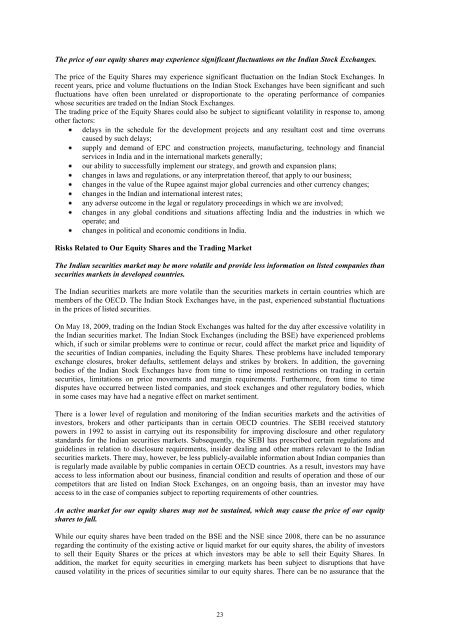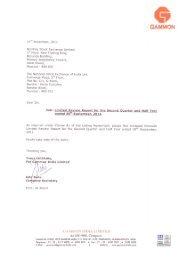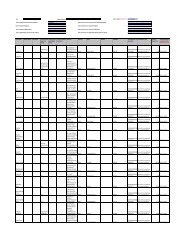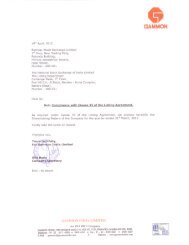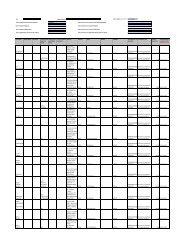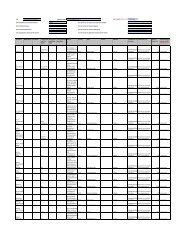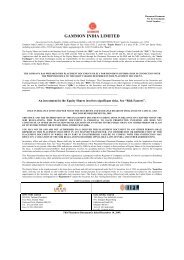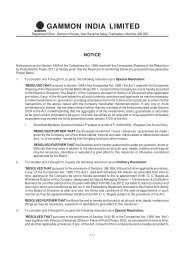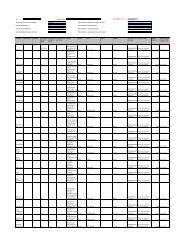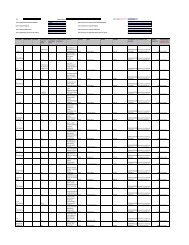GAMMON INDIA LIMITED
GAMMON INDIA LIMITED
GAMMON INDIA LIMITED
Create successful ePaper yourself
Turn your PDF publications into a flip-book with our unique Google optimized e-Paper software.
The price of our equity shares may experience significant fluctuations on the Indian Stock Exchanges.<br />
The price of the Equity Shares may experience significant fluctuation on the Indian Stock Exchanges. In<br />
recent years, price and volume fluctuations on the Indian Stock Exchanges have been significant and such<br />
fluctuations have often been unrelated or disproportionate to the operating performance of companies<br />
whose securities are traded on the Indian Stock Exchanges.<br />
The trading price of the Equity Shares could also be subject to significant volatility in response to, among<br />
other factors:<br />
delays in the schedule for the development projects and any resultant cost and time overruns<br />
caused by such delays;<br />
supply and demand of EPC and construction projects, manufacturing, technology and financial<br />
services in India and in the international markets generally;<br />
our ability to successfully implement our strategy, and growth and expansion plans;<br />
changes in laws and regulations, or any interpretation thereof, that apply to our business;<br />
changes in the value of the Rupee against major global currencies and other currency changes;<br />
changes in the Indian and international interest rates;<br />
any adverse outcome in the legal or regulatory proceedings in which we are involved;<br />
changes in any global conditions and situations affecting India and the industries in which we<br />
operate; and<br />
changes in political and economic conditions in India.<br />
Risks Related to Our Equity Shares and the Trading Market<br />
The Indian securities market may be more volatile and provide less information on listed companies than<br />
securities markets in developed countries.<br />
The Indian securities markets are more volatile than the securities markets in certain countries which are<br />
members of the OECD. The Indian Stock Exchanges have, in the past, experienced substantial fluctuations<br />
in the prices of listed securities.<br />
On May 18, 2009, trading on the Indian Stock Exchanges was halted for the day after excessive volatility in<br />
the Indian securities market. The Indian Stock Exchanges (including the BSE) have experienced problems<br />
which, if such or similar problems were to continue or recur, could affect the market price and liquidity of<br />
the securities of Indian companies, including the Equity Shares. These problems have included temporary<br />
exchange closures, broker defaults, settlement delays and strikes by brokers. In addition, the governing<br />
bodies of the Indian Stock Exchanges have from time to time imposed restrictions on trading in certain<br />
securities, limitations on price movements and margin requirements. Furthermore, from time to time<br />
disputes have occurred between listed companies, and stock exchanges and other regulatory bodies, which<br />
in some cases may have had a negative effect on market sentiment.<br />
There is a lower level of regulation and monitoring of the Indian securities markets and the activities of<br />
investors, brokers and other participants than in certain OECD countries. The SEBI received statutory<br />
powers in 1992 to assist in carrying out its responsibility for improving disclosure and other regulatory<br />
standards for the Indian securities markets. Subsequently, the SEBI has prescribed certain regulations and<br />
guidelines in relation to disclosure requirements, insider dealing and other matters relevant to the Indian<br />
securities markets. There may, however, be less publicly-available information about Indian companies than<br />
is regularly made available by public companies in certain OECD countries. As a result, investors may have<br />
access to less information about our business, financial condition and results of operation and those of our<br />
competitors that are listed on Indian Stock Exchanges, on an ongoing basis, than an investor may have<br />
access to in the case of companies subject to reporting requirements of other countries.<br />
An active market for our equity shares may not be sustained, which may cause the price of our equity<br />
shares to fall.<br />
While our equity shares have been traded on the BSE and the NSE since 2008, there can be no assurance<br />
regarding the continuity of the existing active or liquid market for our equity shares, the ability of investors<br />
to sell their Equity Shares or the prices at which investors may be able to sell their Equity Shares. In<br />
addition, the market for equity securities in emerging markets has been subject to disruptions that have<br />
caused volatility in the prices of securities similar to our equity shares. There can be no assurance that the<br />
23


